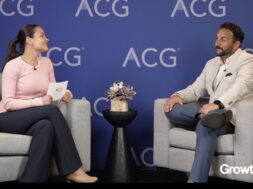Breaking Down the Blockchain Opportunity
Experts at ACG Raleigh Durham’s Capital Conference offered insight into the transformative technology and its potential for disruption across industries.

Misconceptions and skepticism surround blockchain—best known as the infrastructure behind bitcoin—but the business community is beginning to take note of the transformative potential of the technology.
“This is the biggest revolution we will see in our lifetimes,” said Mark Yusko, CEO and chief investment officer with asset manager Morgan Creek Capital Management.
Yusko gave the keynote address during a program focused on the crypto economy hosted by the Association for Corporate Growth’s Raleigh Durham chapter on Tuesday. The event featured speakers and panel sessions that explored the varied use cases and investment opportunities associated with blockchain.
Removing the Middle Man
Blockchain refers to a chain of data blocks that compile transactions, which build upon one another, explained Jeff Ward, director of Duke University’s Center on Law and Technology. A “decentralized and distributed, trustless public ledger,” the technology uses code across multiple computers, which reach consensus on a transaction and record it in an immutable log.
“There has never been a more secure ledger system in the history of the world,” he said.
For intermediaries like banks, the technology’s ability to connect users directly without an intermediary threatens their traditional role in commerce, prompting JPMorgan CEO Jamie Dimon to call bitcoin “a fraud.” “Disruptive technologies cause people angst,” Yusko said.
Today it can take 30 days to settle a contract; that could be done instantaneously using blockchain, he said. Any time money transfers across a border, two banks get paid, a model he views as inefficient and expensive. “That’s ridiculous. It’s going away.”
“This is the biggest revolution we will see in our lifetimes.”
MARK YUSKO
CEO & Chief Investment Officer
Morgan Creek Capital Management
A Smarter Contract
Blockchain’s applications extend beyond currency transactions, and therein lies its true disruptive potential, Ward said, speaking during the event’s opening session. “The more we focus on replacement, the less we can use smart contracts or communicate directly.”
So-called smart contracts—which automatically execute the terms of an agreement based on computer code—“have the potential to shift the balance of power between buyers and sellers,” according to Jim Verdonik, a securities attorney and adviser for technology- and science-based businesses at Ward and Smith, speaking during the panel session “Blockchain: Where to Next?”
In the case of an insurance smart contract, an internet-enabled vehicle could immediately alert an insurance company after an accident. The car could report any damage and, using the smart contract’s logic (if a particular action occurs, it triggers a set response), facilitate an immediate payout.
The test of this type of contract will be whether such contracts can be designed that are sufficiently air tight so as not to be unwound in court, Verdonik said.
Transformative Potential
The disintermediation and security inherent in the public blockchain could enable individuals one day to own their own data and grant permission for the specific details they share. The controversy over Facebook’s treatment of data privacy and last year’s Equifax hack have shined a spotlight on the gatekeepers and the eroding trust of users.
“We went through a period of time where we put everything online,” said David Yerger, managing partner at hedge fund RDG Funds. “All of these institutions put our data online. But how are they securing it?”
Using blockchain to offer fractional interest in property is another area where the technology could transform industries, specifically those in which a bundle of rights is divided among multiple stakeholders, according to Robert Massey, a tax partner with Deloitte who focuses on blockchain and cryptocurrency.
He cited songwriting, pharmaceutical drugs and aftermarket concert tickets as several examples of areas where blockchain could effect meaningful change.
“Take tickets,” Massey said. “If you put it on a chain, and every time (the ticket) changed hands, a percent of the sales went back to Lady Gaga.” Instead of scalpers profiting from sales of tickets to sold-out concerts, the artist would profit from the increased prices.
The technology has the potential to streamline payments and ensure fairly divided compensation across a wide range of applications. “I think every industry is looking at this in some fashion,” he said.

Kathryn Mulligan is the editor of Middle Market Growth.


